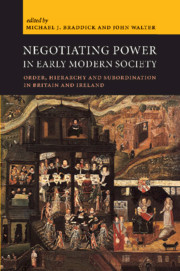Book contents
- Frontmatter
- Contents
- Notes on contributors
- Acknowledgements
- List of abbreviations and conventions
- Introduction. Grids of power: order, hierarchy and subordination in early modern society
- 1 Ordering the body: illegitimacy and female authority in seventeenth-century England
- 2 Child sexual abuse in early modern England
- 3 Sex, social relations and the law in seventeenth- and eighteenth-century London
- 4 Exhortation and entitlement: negotiating inequality in English rural communities, 1550–1650
- 5 Public transcripts, popular agency and the politics of subsistence in early modern England
- 6 ‘Bragging and daring words’: honour, property and the symbolism of the hunt in Stowe, 1590–1642
- 7 Administrative performance: the representation of political authority in early modern England
- 8 Negotiating order in early seventeenth-century Ireland
- 9 Order, orthodoxy and resistance: the ambiguous legacy of English puritanism or just how moderate was Stephen Denison?
- 10 Making orthodoxy in late Restoration England: the trials of Edmund Hickeringill, 1662–1710
- Notes
- Index
6 - ‘Bragging and daring words’: honour, property and the symbolism of the hunt in Stowe, 1590–1642
Published online by Cambridge University Press: 13 March 2010
- Frontmatter
- Contents
- Notes on contributors
- Acknowledgements
- List of abbreviations and conventions
- Introduction. Grids of power: order, hierarchy and subordination in early modern society
- 1 Ordering the body: illegitimacy and female authority in seventeenth-century England
- 2 Child sexual abuse in early modern England
- 3 Sex, social relations and the law in seventeenth- and eighteenth-century London
- 4 Exhortation and entitlement: negotiating inequality in English rural communities, 1550–1650
- 5 Public transcripts, popular agency and the politics of subsistence in early modern England
- 6 ‘Bragging and daring words’: honour, property and the symbolism of the hunt in Stowe, 1590–1642
- 7 Administrative performance: the representation of political authority in early modern England
- 8 Negotiating order in early seventeenth-century Ireland
- 9 Order, orthodoxy and resistance: the ambiguous legacy of English puritanism or just how moderate was Stephen Denison?
- 10 Making orthodoxy in late Restoration England: the trials of Edmund Hickeringill, 1662–1710
- Notes
- Index
Summary
… some of them being armed with guns, some of them with swords, and some with clubs or pikestaves, were a hunting upon Sir Peter Temple's ground in the parish of Stowe, and killed a deer upon Sir Peter's ground, and gave out many bragging and daring words, some of them swearing that the deer was theirs and that they would carry him away or else they would lose their lives in the place.
John Symons, June, 1642On 7 June 1642, John Symons, a servant of Sir Peter Temple, challenged these words, attempted to seize the deer, and received a blow to the head from John Rands, a servant of Peter Dayrell, his mastera's enemy. Perhaps an argument over a dead animal in a corner of northwestern Buckinghamshire seems a dubious point of departure for a discussion of order and hierarchy in early modern England. Most forms of violence, personal and collective, are usually understood as expressions of disorder, as evils excluded from prescriptive notions of a rightly ordered world. According to this view, the trespass on Sir Peter Temple's land in Stowe, a disorderly and perhaps criminal action, would precede and explain the violent confrontation. Violence is seldom construed as an aspect of the creation of order. This essay explores the violence between Symons and Rands, and the martial conflict between the Dayrell and Temple families in Stowe that supplied its immediate motives, to uncover the violent contests inherent in the culture of gentility, an essential element in early modern English views of order.
- Type
- Chapter
- Information
- Negotiating Power in Early Modern SocietyOrder, Hierarchy and Subordination in Britain and Ireland, pp. 149 - 165Publisher: Cambridge University PressPrint publication year: 2001
- 2
- Cited by

